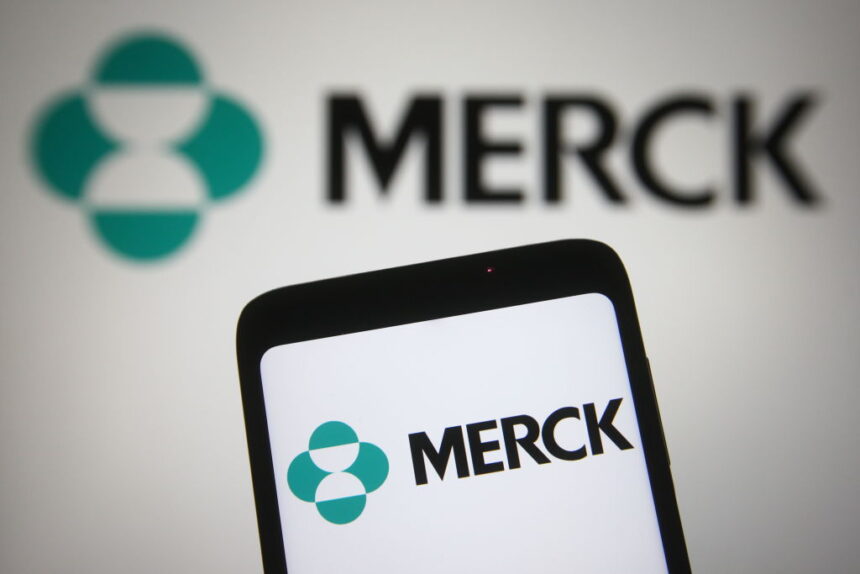It was a tale of two drugmakers when it came to earnings in Q4 2023.
Merck recorded quarterly profits Thursday morning that surprised analysts while Roche’s misses weighed down its promising financial guidance for 2024.
Check out a breakdown of both companies’ respective financial performance in Q4 and 2023 as a whole.
Merck starts year on upbeat note
Despite some sizable declines across key financial metrics in 2023, Merck produced a favorable earnings report.
For the most recent quarter, Merck saw sales grow 6% year-over-year to $14.6 billion. For the full year, sales inched up 1% to $60.1 billion.
Throughout the year, the drugmaker was buoyed by sales of cancer immunotherapy Keytruda, which saw sales grow 19% to $25 billion, as well as HPV vaccine Gardasil, which saw sales rise 29% to $8.9 billion. Its pharmaceutical division saw sales grow 14% during 2023, excluding oral antiviral Lagevrio and the impact of foreign exchange.
Still, despite the top-line growth, Merck saw its net income drop 95% from 2022, finishing 2023 with $365 million, while its GAAP earnings per share (EPS) tumbled 98% to $0.14. Similarly, the company posted a net loss of$1.2 billion in Q4 and a net loss per share of $0.48.
Outside of its sales performance, Merck was active on the dealmaking front like other Big Pharma companies in Q4. Most notably, Merck acquired preclinical biotech Caraway Therapeutics in November, a transaction that could be worth up to $610 million if certain milestones are met.
Just after the New Year, the company also purchased Harpoon Therapeutics in a deal worth up to $680 million.
Looking ahead to 2024, Merck projected worldwide sales between $62.7 billion and $64.2 billion, along with a non-GAAP EPS between $8.44 and $8.59, exceeding analyst expectations. Wall Street warmly greeted the news, with the stock rising during trading early Thursday morning.
Merck also released its earnings one week before its CEO Robert Davis is scheduled to appear before the Senate Health, Education, Labor and Pensions Committee alongside Johnson & Johnson CEO Joaquin Duato and Bristol Myers Squibb CEO Chris Boerner to testify about high drug prices in America.
Merck is among the list of drugmakers that have sued the federal government over the Medicare drug pricing negotiation provision included in the Inflation Reduction Act.
“2023 was another very strong year for Merck. I am extremely pleased by the progress we’ve made to develop and deliver transformative therapies and vaccines that will help save and improve lives around the world. We reached more than 500 million people with our medicines last year alone, over half of which were donations, including through our program to treat river blindness,” Davis said in a statement. “We also made investments of approximately $30 billion in research and development in our ongoing effort to discover, develop and collaborate to propel the next generation of impactful innovations. As we move forward, I’m confident that our strong momentum will continue, underpinned by the unwavering dedication of our talented global team.”
Roche disappoints
While Merck’s year-end performance led to positive sentiment on Wall Street, the same could not be said for Roche, which saw its profit and sales fall during 2023.
Though group sales rose 1% at constant exchange rates (CER), they fell 7% in Swiss Francs (CHF). The company’s core operating profit fell as well, down 1% at CER and 13% in CHF.
Roche’s diagnostics sales dropped 13% during the year due to waning demand for COVID-19 products, but the company said group sales increased 8% when COVID sales were excluded.
Following the earnings release, the company’s stock was trading down more than 5% by late Thursday morning.
“We achieved good sales growth that more than offset the sharp drop in COVID-19 sales. Roche’s base business – excluding COVID-19 – continued its strong growth momentum with +8% at constant exchange rates,” Roche CEO Thomas Schinecker said in a statement. “As a result, we exceeded our guidance for 2023. At the same time, the significant appreciation of the Swiss franc versus most currencies strongly impacted results when reported in Swiss francs. We also made good progress in both our pharma and diagnostics product pipeline. One recent highlight is inavolisib, an oral therapy investigated in phase III trials which showed a reduction of more than 50% in the risk of death or worsening disease for patients suffering from advanced, hard-to-treat breast cancer. We look forward to bringing this medicine to patients as soon as possible. Our new partnerships and acquisitions address disease areas with high unmet needs, such as inflammatory bowel disease and cardiometabolic disease. We are well positioned for future growth.”
As for the future, Roche said it expects an increase in group sales in the mid-single-digit range at CER, with core earnings per share in line with sales growth at CER, excluding the impact from resolution of tax disputes in 2023.
Roche is also banking on a strong entrance into the GLP-1 market.
Its nearly $3 billion acquisition of Carmot Therapeutics at the end of the year may serve as a major differentiator in the increasingly competitive field, even bringing the company up to par with sector leaders Eli Lilly and Novo Nordisk, per a recent analysis.







